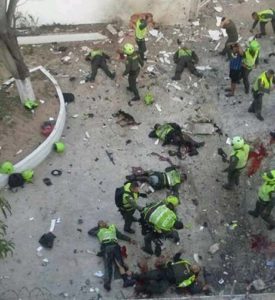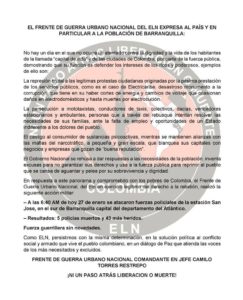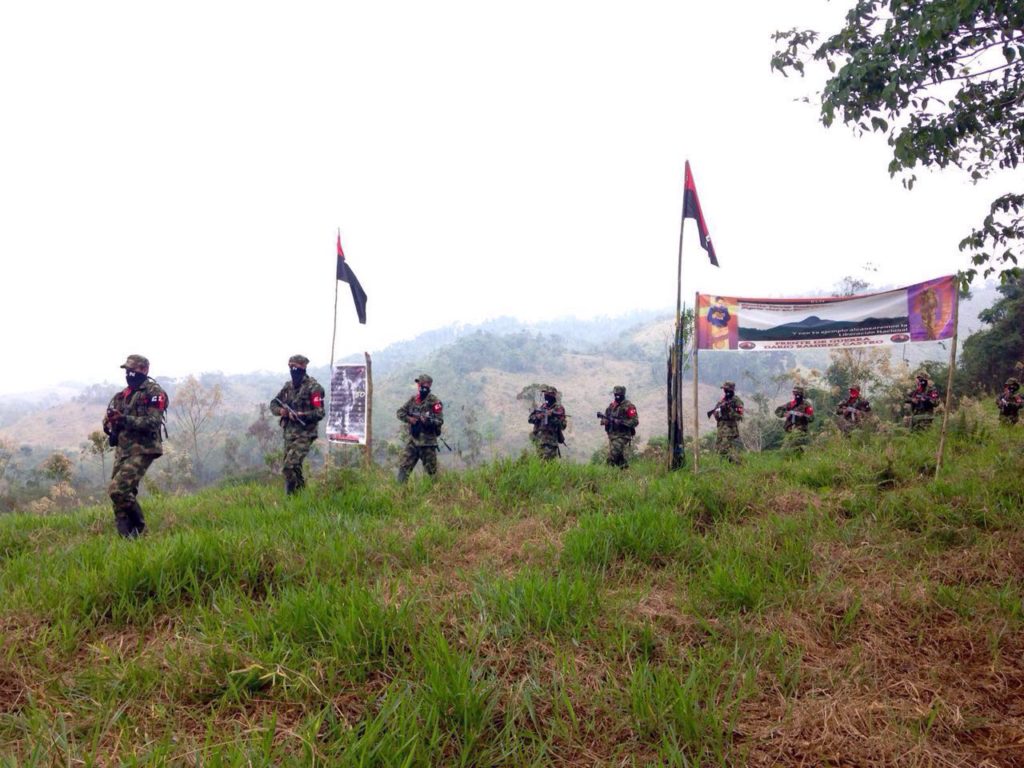A group that engages in kidnapping, ecological destruction and terrorism doesn’t deserve a seat at the negotiation table
The near-universally condemned terrorist attacks in Barranquilla a week ago that killed seven police officers and left almost 50 wounded demonstrates one thing: the National Liberation Army (ELN) guerrillas are not serious about peace talks with the Colombian government.
Colombians have no taste for war, but after nearly 54 years of conflict, they have grown accustomed to it, and for those in (now most) major cities, indifferent. And who can blame them? Colombians have had to put up with a decades-long spectacle of horrors that few other peoples have ever endured. So it takes a lot to shock them. A few soldiers or police dying in a firefight with commies or coke traffickers, and most people here shrug and check their phones for the latest soccer scores. But what happened on January 27th and 28th was a rare exception. It was violence so callous and extreme that even the most hardened person stopped and took notice.
After the triple bombing, Colombian President Juan Manuel Santos rightly suspended peace talks with the ELN indefinitely, “until I see coherence between their words and actions,” he said. The casualness of his tone was worrisome; the word “until” suggests that Santos thinks that the negotiations are still salvageable. But we’re on new ground now. There has been a dark shift in the direction of the conflict, with the guerrilla group’s adoption of a strategy that we’re more used to seeing in the Middle East – or during Pablo Escobar’s reign of terror. Even if Santos doesn’t realize it or refuses to recognize it, there is no going back.
If the president needs some convincing, here are five reasons why negotiating with the ELN is no longer an option:
They have not renounced activities like kidnapping
The kidnapping of civilians for whatever reason is never justifiable, even if the guerrillas’ motives for doing so is to detain a suspected collaborator or spy. It is the exclusive domain of thugs, gangsters and terrorists. Continuing to kidnap people makes a mockery of any ongoing peace talks, makes government peace negotiators look ineffectual, and guerrilla negotiators appear out of control of their own rank and file. The state also looks weak, and the inevitable result is widespread contempt for the process, and worse, cynicism towards the idea of reconciliation. Even the ELN’s big brother, the Revolutionary Armed Force of Colombia (FARC) realized this during the early stages of their peace talks with the government, and smartly dropped the practice of kidnapping.
They have a renewed enthusiasm for terrorist tactics
The unilateral ceasefire the ELN declared – the first one in its history – expired last month, and since then, the government and ELN negotiators in Quito, Ecuador, were discussing the terms of a renewed bilateral ceasefire. Even the most basic respect for human dignity should have warranted a lull in hostilities while these talks were taking place, but no, the guerrillas grew trigger-happy after 102 days without destruction, and were eager to go out and fulfill their standing orders with renewed zeal. “The national government was always open to extending the ceasefire with this group and negotiating a new one,” President Santos said on January 10. “Inexplicably, the ELN didn’t just refuse but resumed attacks.”
The rebels broke the ceasefire by hurling a grenade at two soldiers guarding a military base in the eastern province of Arauca, and blew up an oil pipeline near a town called Aguazaul, Casanare province, about 160km away from Bogota. They also employed a new tactic – terrorism. The pair of bombs they set off on Saturday morning, and then again with a third bomb in the early hours of Sunday, gave new life, so to speak, to the popular hatred of the violent fringe group. It took place in a city that has until now been spared much of the violence of the decades-long civil war, and thus made Barranquilla a ‘soft’ target wholly unprepared for the chaos that ensued. Their victims had no hand in battling the guerrillas. They were targeted simply for being police officers.

Police officers tend to their dead and wounded comrades in the wake of an ELN terrorist attack in Barranquilla, Colombia late last month.
For Santos to restart talks with the ELN at this point would be regarded as a slap in the face to the victims and their families, and would hurt his already dismal approval ratings. He would be seen as treating his security forces as expendable pawns in a dark chess game, and too ready to capitulate to murderous thugs in the interests of peace – and rightfully so.
(I know what some of you are thinking – the FARC bombed the Nogal country club in Bogota in 2003, killing 36 people, and still went on to sign a peace deal with the government – so why couldn’t there still be hope for successful talks with the ELN? In that case, the terrorist attack wasn’t carried out during active peace talks, nor did it occur just days after a ceasefire expiry date).
They have lost their legitimacy as a political actor
Despite all the rhetoric about standing up for the rights of the common people against an apathetic and corrupt oligarchy, much of the blood of the very people they ostensibly fight for is on their hands. The ELN lost its credibility as a champion for the downtrodden and established itself as a bona fide terrorist group long before the Barranquilla bombings – almost 20 years ago, to be exact. In the dead of night on October 18, 1998, the ELN blew up the Ocensa oil pipeline near the town of Segovia, Antioquia. The ensuing inferno the blast caused ripped through the town and incinerated 84 people as they slept. Ironically, or perhaps prophetically, this deadly attack took place during informal discussions with the administration of then-president Andres Pastrana, who immediately suspended talks.
It is a special talent of the hardened ideologue to see themselves as faultless; to ignore, deny or dismiss the crimes they have committed. This is as true for the guerrillas as it is for any other extremist group. Shortly after the latest ceasefire expired, Gustavo Giraldo, aka ‘Pablito’, commander of the ELN’s Domingo Laín Eastern Front, said: “(the ELN) has all the will to engage in dialogues within a correspondence in the recognition by the state of our validity and of our revolutionary reality. To which the state sometimes tries to confuse, entangle and misinform. The ELN is not willing to submit. The ELN is proposing a political negotiation. (The government) wants to see us as terrorists and we are not.”
Seventeen days later, an ELN faction calling itself the Front for Urban Warfare carried out the Barranquilla bombings. I suspect that ‘Pablito’ still doesn’t believe he and his organization are terrorists.
They have no regard for the environmental damage they cause
One of the ELN’s favorite “revolutionary” activities of choice, when they’re not killing police officers, is bombing attacks against the network of oil pipelines that crisscross the country, most notably, one of Colombia’s longest oil arteries called the Caño Limón Coveñas pipeline. When they do so, they halt the transport of oil to coastal ports where it is exported – their stated objective – and in the process, cause the spillage of hundreds to thousands of gallons of crude oil into the environment, polluting surrounding ecosystems and contaminating the drinking water of nearby communities.
On January 10, the guerrillas conducted a triple bomb attack at three points along the Caño Limón Coveñas pipeline that runs through Arauca and Boyaca provinces. One of the bombings took place near the village of La Cañaguata, in Boyaca, spilling toxic crude oil across 300 linear meters. The two other attacks were reported in the villages of La Granada and Miramar in Saravena, Arauca. One of the blasts was powerful enough to leave a crater so large that much of the spillage managed to pool within it, containing what could have been a much worse oil spill.

The aftermath of the Caño Limón Coveñas pipeline following an ELN bombing attack on January 10.
On January 13, the Marxist group also kidnapped an Ecopetrol contractor repairing damage to the pipeline they had destroyed three days before, Reuters reported.
Four days after the Caño Limón Coveñas blasts, the ELN bombed the Transandino pipeline in Nariño province in southern Colombia, an attack that spilled a still-unknown quantity of crude oil into a nearby river.
While the guerrillas defend these activities as a form of resistance against a “tyrannical” state apparatus, the environmental impact as a direct result of these bombings has been catastrophic. One study indicates that between 2000 and 2017, a total of 66 million gallons of crude oil have been spilled into the environment in various parts of the country as a result of sabotage; the majority of these attacks were attributed to, or claimed by, the ELN rebels.
They have lost touch with reality
The ELN’s level of hypocrisy and cynicism is mind-numbing. The group has the dubious distinction of being one of Colombia’s top polluters, and yet they still have the gall to blame others for environmental damage. From the ELN website: “Poverty and misery of the Colombian people is compounded by the lack of contingency plans to address the environmental damage caused by the irrational exploitation of nature … There is already a large percentage of municipalities that are in emergency, with water shortages.”
One wonders which is worse – water shortages, or water that is contaminated with toxic chemicals because of bomb attacks.
In its communiqué claiming responsibility for the Barranquilla bombings – just two weeks before the annual Carnival festivities are to begin – the ELN blamed everything from the substandard Electricaribe power service and the lack of employment opportunities in the city, to drug addicts who suffer “while alliances with drug trafficking mafias are maintained.” Again, the group’s hypocrisy is so atrocious that it could constitute a psychotic break with reality; the ELN’s Juan Fernando Porras Martínez Front, which operates in the Catatumbo region of Norte de Santander province, is the biggest cocaine trafficker in the region.

ELN leaflet claiming responsibility for the bombings in Barranquilla that killed seven police officers, and some of their stated reasons for doing so.
The utter fiction that constitutes their motives, and the real impact of their actions, allows the ELN to describe their crimes as “military operations,” and their victims “military objectives.” Perhaps this cognitive dissonance allows them to sleep at night – it being the only way that a person can distance themselves from the things they have done. The ELN’s rhetoric is so divorced from reality one can be forgiven for wondering if they believe it themselves. In any case, trying to negotiate with these sadists is equally insane.
***
There are no easy answers, and no one wants perpetual war (save for Colombia’s Uribista-evangelical-Alejandro Ordoñez crowd) but a group that would embark on a campaign of terrorism, murder, and environmental destruction does not deserve a seat at a table in some fancy Quito hotel. The guerrillas try to explain away their adventurism and bloodlust as justification for some revolutionary cause, but nobody’s buying it. Whatever their claims, they are criminals and must be treated as such – with life-long prison sentences or the grave.
For the Santos administration to forgo justice and reward the ELN for their heinous crimes with lenient punishments sets a dangerous precedent; arguably one has already been set – first by the incomplete demobilization of the right-wing paramilitaries, and more recently with the FARC – and could encourage apolitical drug gangs like the Autodefensas Gaitanistas de Colombia (AGC) to demand peace talks of their own. And when the government refuses, these groups will have learned the lesson forged by other killers: that the road to the negotiation table is littered with dead bodies.
With Santos already in the lame-duck stages of his presidency, and the very idea of peace talks being a political hot-potato that few presidential contenders want to touch, the best thing the outgoing president could do for his successor is launch a full-on military offensive against the ELN, to show them that there are consequences for committing acts of terrorism. An aggressive assault would give the new president the ability to force Colombia’s last-standing guerrilla army to choose between one of two options: total surrender or complete annihilation.

Journalist. Misfit. Malcontent. Provocateur. Is a better Colombia is possible? We’re starting to have doubts.


Pingback:Peace in Colombia? What Peace? | MiKolombia.com